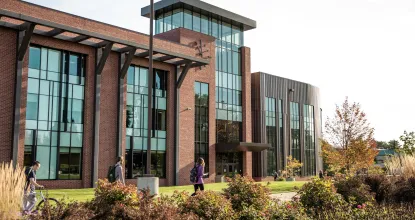The Northern Michigan University has been continually improving a comprehensive recycling program for the university community. Some of the many reasons for pursuing these goals include:
- enabling the university community an opportunity to participate in the conservation of natural resources
- enabling the university to play a significant role in decreasing the rate at which the Marquette County Landfill reaches its maximum capacity
- saving significant sums of money that would otherwise be spent for hauling trash to the landfill
In order for a university recycling program to be effective it is essential that all members of the community take their share of the responsibility. The loop at the top of the page is a reminder to us that recycling is a loop. If recycling is to succeed, we as consumers must purchase post-consumer recycled products. Buy recycled!
Types of NMU Recycling
NMU's recycling program started in 1992 and has reduced the amount of material sent to the landfill by nearly 380 tons per year. Single sort is the most recent initiative under the recycling umbrella and represents part of the overall effort to create a more sustainable NMU. The Single Sort program started in the Residence Halls in 2007 and has since been implemented campus wide. Follow the guidelines below to learn which materials are acceptable for recycling.
NMU 'single sort recycling is brought to the Marquette County Solid Waste Management Authority. Please Watch this video to for recycling tips!
Acceptable Materials
- aluminum cans
- tin and steel cans - rinsed
- plastic milk jugs
- plastic bottles
- newspaper and newspaper inserts
- magazines and catalogs
- junk mail and envelopes
- office and school papers - colored paper too
- cardboard
- boxboard - cereal, cake, and cracker boxes
- brown paper bags - grocery type
- phone books
Materials that are Not Acceptable
- plastic bags
- food waste, garbage or yard waste
- food tainted items - used paper plates, paper towels or paper napkins
- pizza boxes
- egg cartons
- ice cream cartons
- paper/waxy milk cartons
- aluminum foil
- plastic cups and silverware
- aerosol cans
- plastics and other bottles - items like clear plastic strawberry containers
- juice boxes/bags
The NMU battery recycling program began in 2008. Battery recycling containers are located in several buildings on campus where consumer batteries can be placed by faculty, staff and students. Central Receiving staff periodically collects them and brings them for recycling.
Types of batteries accepted include: AAA - AA - C - D - 9 Volt - Button - Photo Electronic - Lantern - Nickel Cadmium
Thank you for your cooperation and for recycling.
The Michigan Department of Natural Resources, under guidelines from the Environmental Protection Agency, has notified Northern Michigan University that it can no longer throw out fluorescent lamps, in an effort to reduce the amount of mercury being deposited in the local landfill. The information provided below is to assist you in the easy procedures to follow to recycle.
Steps to Recycle - Fluorescent Lamps
-
The ordering and delivery of fluorescent lamps to using departments remains unchanged.
-
When fluorescent lamps are replaced, put old lamps back into manufacturers original container, removing cardboard separators as appropriate.
-
When container is full of old lamps, mark "FOR RECYCLING" with lamp count on the outside of the container. Make sure to seal the containers shut with tape. Circular and U-shape lamps can be handled in the same manner.
-
Central Receiving will pick these containers up from wherever they deliver supplies to, as part of normal operations. The lamps will then be picked up from the Central Warehouse by a licensed recycling firm as required.
Do not:
- Pack different lengths together
- Send partly filled boxes
- Allow lamp boxes to get wet
- Tape lamps to each other
- Absolutely no debris in with lamps!!!
Computer Components
The Michigan Department of Natural Resources, under guidelines from the Environmental Protection Agency, has notified Northern Michigan University that it can no longer throw out computer components, in an effort to reduce the amount of mercury being deposited in the local landfill. The information provided below is to assist you in the easy procedures to follow to recycle.
Steps to Recycle - Computer Components
- If the computer does not work, label it as "RECYCLE" and contact Central Receiving (2749) for pickup.
- If the computer is functional, identify accordingly and contact Central Receiving (2749) for pickup. All hard drives should be completely cleared of all data prior to pickup.
Academic Buildings
All classrooms and faculty offices are supplied with a single sort recycling bin. If you are without one of these containers contact the Facilities department at 227-2292.
Waste Oil/Anti-freeze
All waste oil and anti-freeze from the university's 59 vehicle fleet and all grounds equipment is collected and recycled.
Metal
All waste steel and non-ferrous metals that are property of the university are diverted from the landfill by our metal recycling program.
Since May 2010, NMU has recycled 100 tons (200,000 lbs.) of metal. Included in this tonnage is metal shelving recycled by the Learning Resources Center as well as metal recycled from building demolition with the start of NMU's new Combined Heat and Power (CHP) Plant.
Residence halls
Each residence hall room is equipped with a recycling bin to encourage residents to recycle everyday products. NMU has programs that support recycling the following materials: Batteries, glass, latex paint, ink jet/toner cartridges, metal, paper, plastic and waste oil.
For more information on Living Green & Gold
